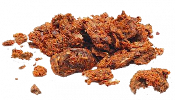
The main contraindication to the use of propolis is the presence in humans of an allergy to any beekeeping products – honey, propolis, bee bread, royal jelly, wax. Do not use propolis for persons who are allergic to bee stings. Propolis is contraindicated for patients suffering from polyposis, atopic asthma, urticaria, allergic rhinitis, dermatitis, eczema and diathesis. If a patient has acute liver diseases it should not be taken orally and in suppositories. With chronic liver diseases the use of propolis is allowed. Propolis should be used with care for patients with infectious-allergic asthma, as a significant exacerbation of the disease is possible. Currently, bee products (honey, propolis, royal jelly, bee venom) are often included in the recipe of some foods, chewing gum, complex medications, creams, hair strengthening products, etc. Therefore, persons with allergies should study the composition of the product before using.
Propolis Treatment Complications And Relief Assistance
Most people tolerate propolis well, complications are rare, and their outcome is favorable. The doctor prescribing propolis to the patient is obliged to warn him about possible complications. Intolerance to propolis can manifest as a common allergic reaction in the form of urticaria, skin itching, swelling, choking, fever, abdominal pain, nausea, vomiting, diarrhea. Collapse and shock are extremely rare.
Local reaction is possible in the form of local itching, local edema, redness, blistering, vesicular eruptions, dryness and cracking of the skin, especially on the hands and other parts of the body that come in contact with propolis or product containing propolis. Signs of the poor tolerability to oral intake of propolis – dry mouth, abdominal discomfort. In certain individuals, propolis may cause an exacerbation of a chronic disease, increased manifestations of dermatitis, and increased asthma attacks.
Most researchers believe that propolis in the usual therapeutic doses is not toxic and is well tolerated. Signs of toxic effects appear only with a significant excess of the daily and course dose, or with individual intolerance, especially in patients with diseases of the liver and kidneys. Prolonged use of propolis solution for irrigation of the oral mucosa in some patients may lead to an increased sensitivity to it.
The emergency assistance in the event of a pronounced allergic reaction to propolis is carried out according to all the rules for dealing with allergic manifestations. It is necessary to begin with the termination of contact with propolis. When applied externally, it is best to wash it off with a swab soaked in ammonia and glycerin at a ratio of 1:4 (avoiding getting mixture into wounds) or wash the skin, mucous membranes, and wound with weak potassium permanganate solution. If propolis was taken orally, immediately induce vomiting, flush the stomach with a weak water solution of potassium permanganate, and then give the patient an absorbent.
Treatment of wounds with propolis is sometimes accompanied by hypergranulation of the wound edges. In such cases further treatment with propolis is terminated.
In case of intolerance to propolis, further contact with it should be avoided.
